Farming
FUW puts spotlight on rural economy
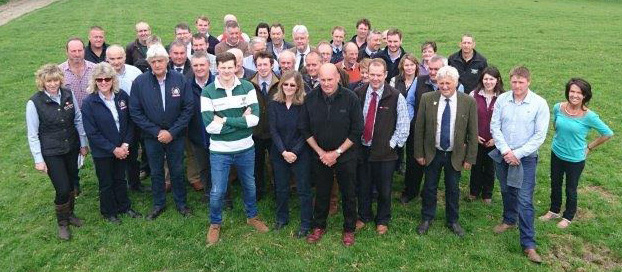
 HOW MANY businesses are involved in the running of a farm and how many people are directly and indirectly employed by the agricultural sector?
HOW MANY businesses are involved in the running of a farm and how many people are directly and indirectly employed by the agricultural sector?
How reliant is the rural community really on farming? Those were the questions the Farmers’ Union of Wales asked recently.
We often think about the obvious options, such as feed merchants, sales and auctioneers businesses, farm contractors etc. but how much does just one farm really contribute?
To try and answer these questions Mid Wales farmers John Yeomans, his wife Sarah and son Joe, recently hosted an event that put the spotlight on the importance of agriculture in the rural economy, at their farm Llwyn y Brain, Adfa, near Newtown.
A survey of the businesses that the Yeomans family deal with revealed 2,347 jobs at local and Welsh level and also 225,980 at a wider national level were dependent on the survival of those businesses.
On the farm, the Yeomans family run a herd of 73 cows consisting of pedigree Limousin, Limousin x, Belgian Blue x, and 15 homebred replacement heifers (closed herd).
They further keep 495 ewes which are mainly Beulah and 160 Beulah ewe lambs and the flock has been closed since 1981.
The couple sell Beulah draft ewes and some yearlings, as well as Welsh Mule ewe lambs for breeding and sell finished lambs on a deadweight basis
The 232 acres of owned farmland sit between 750 feet to 1420 above sea level, with 100 acres (34.8ha) of lower land and 132 acres (53.4ha) of largely improved hill land.
A further 53 acres of additional land is rented.
John, who was keen to explore the wider economic impact his business has on the wider rural economy, said: “Following the downturn in agriculture over recent times and across almost all sectors, I wanted to help highlight the importance of a thriving agricultural sector on the economy – both locally and much further afield.
“Farmers are an exceptional conduit for money, so if their businesses are thriving they reinvest and this, in turn, brings wealth and good fortune to others.
“The difficult times we are facing are clearly already impacting on our ancillary and support industries and businesses.
“With this in mind, we were pleased to put the spotlight on all the businesses – both local and further afield – that have some stake in our survival. Our relationship with these businesses is symbiotic and crucial to both our successes.”
BUSINESSES
ANSWER THE CALL
The event was attended by an array of local businesses and representatives such as Agri-Advisor, Agrimin, Bibby’s, Alpha Plumbers, FUW Insurance Services Ltd., E W Bumford & Co, RVW Pugh Ltd, I Jerman, Binding Tyre Services, Countrywide, Westflight, Morris Marshall and Poole, British Wool Marketing Board, Wynnstay, R G and G R Francis, McCartneys, OPICO, Sainsbury’s, Genus, KiwiKit, Dunbia, E George & Son, Dow AgroSciences, Trefaldwyn Vets, Zoetis, Shearwell Data and HSBC, who play a role in John and Sarah’s daily business routine.
Mr Yeomans said: “I must thank the businesses who came to support the event and those that responded to our short survey for the valuable contribution they make to our business and the wider rural economy.
“Supermarkets and slaughterhouses are just as important in our business as our local garage.
“Over 22% of the employment in Wales is linked to farming or food in some way, so it is worth noting the important role we all play in keeping our economic powerhouse going.
“Individually we may not be making a fortune for our solicitor, bank, garage or anything else. But together we are an important force.
“We hope days like this will help to get the message across about the connection between British food and the many businesses connected to it, why it is worth supporting your local farmer and how much of a difference each individual can make in terms of giving back to the local economy.”
THE ELECTRICAL WHOLESALER
City Electrical Factors (CEF) are one of the businesses the Yeomans family trade with. C.E.F. are a national Electrical Wholesaler supplying businesses the length and breadth of the UK.
The Newtown and Welshpool branches sit in the heart of Mid-Wales and as such are two of the most rural branches in the C.E.F. network.
Across these two branches the company employs 11 staff, and nationally they employ about 2750 members of staff.
Darryl Owen, manager of the two branches, said: “I feel it’s very important to employ local people to serve local people. Many of my staff have strong links to the local agricultural and Farming community.
“For us, in such a rural area, any downturn in agriculture has a serious knock on effect to our business and turnover in Newtown and Welshpool.
“It is not just the direct effect from farming businesses but indirectly through the Electrical Contractors who serve this market sector. We service a very wide and diverse market sector which can all be affected by any downturn in the Farming community.
“Many small industries in Mid- Wales are reliant on a strong agricultural customer base. If these small business begin to struggle they stop spending and that’s a big issue for us.
“The on-going success of C.E.F. in Mid-Wales is undoubtedly linked to the success of our agricultural community. Any effort or campaign that will highlight the importance of a healthy rural economy will definitely have my support.”
MACHINERY SALES
RVW Pugh Ltd, an agricultural machinery dealership that specialise in the sales and aftersales of tractors and farm machinery to the agricultural industry, have their head office in Mellington, Mid Wales.
They have two further depots in Holmes Chapel, Cheshire and Market Drayton, Shropshire.
The company employs 54 employees over the three depots, with 35 of them employed at the head office in Mellington.
Robert Pugh, Managing Director, said: “Agriculture is the backbone of our business, more than 95% of our customers are farmers/contractors. We are obviously feeling the knock on effect of farmers struggling with commodity and produce prices, along with late receipt of single farm payments… at the moment we are owed £1.5m from creditors which fall outside of our 30 day credit terms.
“This obviously puts pressure on our business and holds up cash flow which we could use to further improve and invest in our business during these difficult times.”
AGRICULTURE THE
WELSH POWERHOUSE
Glyn Roberts, FUW President, who attended the event, said: “All the businesses that make the wheel of our rural economy go round have an important role to play in our daily lives and indeed how we all survive and make a living.
“We know that a lot of second and third sector businesses are already struggling as a result of the knock on impact of low agricultural incomes and farmgate prices, and the potential wider impact if there was to be a further downturn in farm incomes could be catastrophic.
“We must remember that agriculture is the powerhouse of the rural economy, generates billions of pounds which benefit a host of industries including many not directly associated with agriculture – something that is clear to see here – today-.
“The impact of the most recent recession on our economy as a whole has been severe, but there can be no doubt that in rural Britain and many of our urban areas the impact has been buffered by the core role agriculture has played in generating income for communities the length and breadth of the UK.
“With this in mind – we as the Farmers’ Union of Wales – will continue to represent and fight for those who make a living off the land and through that, support those second and third sector industries- as we have done since 1955 – in Cardiff, London and Brussels.”
FUW Montgomeryshire County Chairman, Mark Williams, added: “We were keen to explore in more detail how our rural economic powerhouse is sustained by individual farm businesses.
“You’ve got your farm and the people who might be employed on it, whether that is family or external contractors, but it is also about the feed merchants, contractors, machinery dealers, local garages, supermarkets, farm shops, auctioneers, banks and solicitors– all of the businesses that are involved either in a direct or indirect capacity.
“The message going back to consumers across the UK has to be ‘Support your local farmer – Support a thriving rural economy’.”
Farming
Basic Payment Scheme 2025 balance paid to 95% of Welsh farmers
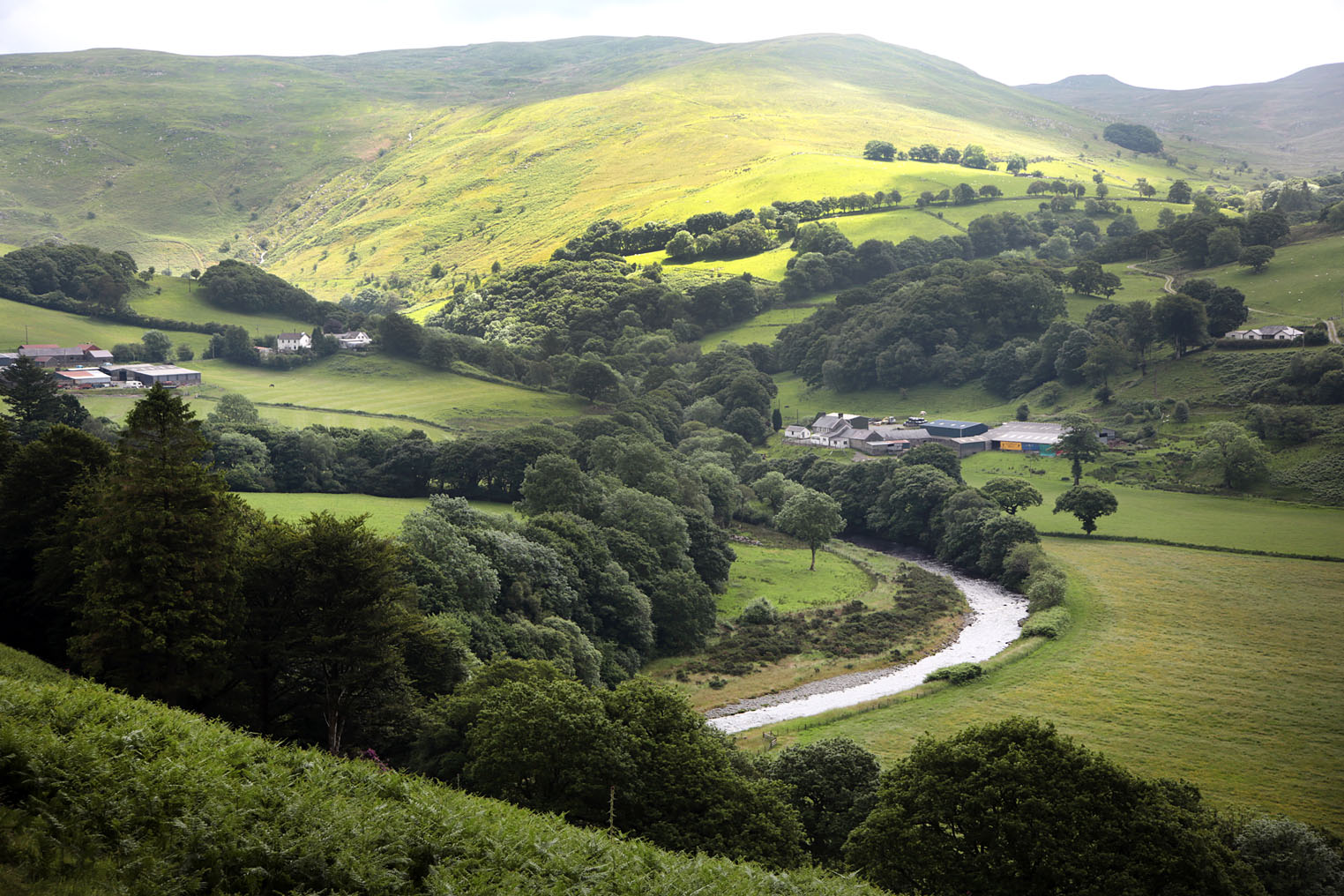
Final year of BPS as transition to Sustainable Farming Scheme begins
The WELSH Government says more than ninety-five per cent of farm businesses have now received their full or balance payment under the final year of the Basic Payment Scheme (BPS), ahead of the introduction of the new Sustainable Farming Scheme (SFS) in 2026.
Announcing the update on Friday (Dec 12), Deputy First Minister and Cabinet Secretary for Climate Change and Rural Affairs, Huw Irranca-Davies, confirmed that over 15,400 Welsh farm businesses have been paid £68.7m. This comes on top of the £160m issued in BPS advance payments since 14 October.
Final round of BPS payments
The Basic Payment Scheme, which has been the backbone of farm support in Wales for a decade, provides direct income support to help farmers plan and manage their businesses. BPS 2025 marks the last year in which full BPS payments will be made before the scheme begins to be phased out.
The Cabinet Secretary said officials would “continue to process the outstanding BPS 2025 claims as soon as possible,” adding that all but the most complex cases should be completed by 30 June 2026.
Payments issued today represent the main balance due to farmers following earlier advances, giving many businesses the cash flow they need during the quieter winter period—traditionally a challenging time in the agricultural calendar.
Shift to Sustainable Farming Scheme in 2026
From 1 January 2026, the Welsh Government will begin rolling out the Sustainable Farming Scheme, a major reform to how agricultural support is delivered. The SFS will reward farmers for environmental outcomes such as habitat management, carbon reduction and biodiversity improvements, alongside continued food production.
The government has argued that the new scheme is essential to meeting Wales’ climate and nature targets while ensuring long-term resilience in the sector. However, the transition has been closely watched by farming unions, who have raised concerns about the administrative burden, income stability, and the speed at which BPS is being phased out.
Mr Irranca-Davies reaffirmed the government’s stance, saying: “This government is steadfastly committed to supporting Welsh farmers to sustainably produce quality food. This is demonstrated today in our payment of the BPS 2025 balance payments and will continue throughout the transition period.”
Sector reaction
Farming unions are expected to scrutinise the detail of today’s announcement, particularly around remaining unpaid cases. Last year, late payments led to frustration in parts of the sector, with unions calling for greater certainty as the industry faces rising input costs, supply chain pressures and continued market volatility.
The move to the SFS remains one of the most significant agricultural policy changes in Wales since devolution. Ministers insist the shift is designed to support both food production and environmental stewardship, while critics warn the transition must not undermine farm viability—especially for family-run livestock farms that dominate rural areas such as Pembrokeshire, Ceredigion and Carmarthenshire.
What happens next
Farmers still awaiting their BPS 2025 balance will continue to be processed “as soon as possible”, the Welsh Government said. Officials will also publish updated guidance on the Sustainable Farming Scheme ahead of its launch.
The coming year will therefore become a pivotal moment for Welsh agriculture, as the long-standing BPS framework—which provided over £200m annually to Welsh farmers—makes way for a new results-based model that will shape the industry for decades to come.
Community
Wolfscastle farm’s new shed sparked ‘noise nuisance’ claims
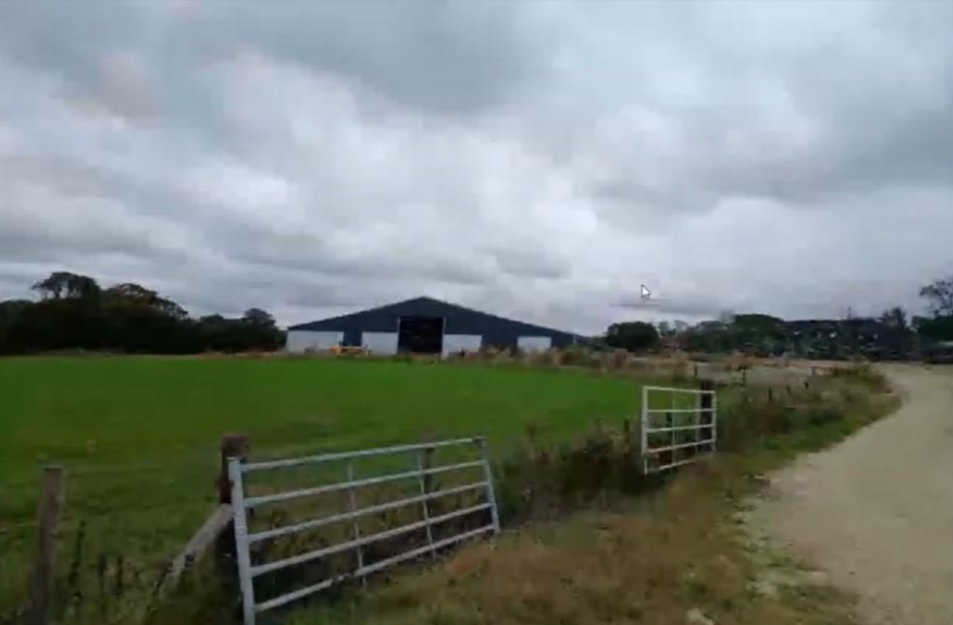
A PEMBROKESHIRE farmer “jumped the gun” in his enthusiasm to build a new cattle shed which includes ‘robot slurry scrapers’ that have been causing a noise nuisance for neighbours, county planners heard.
In a retrospective application recommended for approval at the December meeting of Pembrokeshire County Council’s planning committee, Aled Jenkins sought permission for a replacement cattle housing and silage clamp at Upper Ty Rhos, Wolfscastle.
An officer report said Upper Ty Rhos consists of a herd of 630 youngstock beef cattle, the applicant seeking permission for the replacement 100-metre-long cattle housing building.
It said the building benefits from a robotic scraping system to internally clean it to improve animal welfare and efficiency.
However, the slurry scraper system in operation has been found to constitute a statutory noise nuisance.
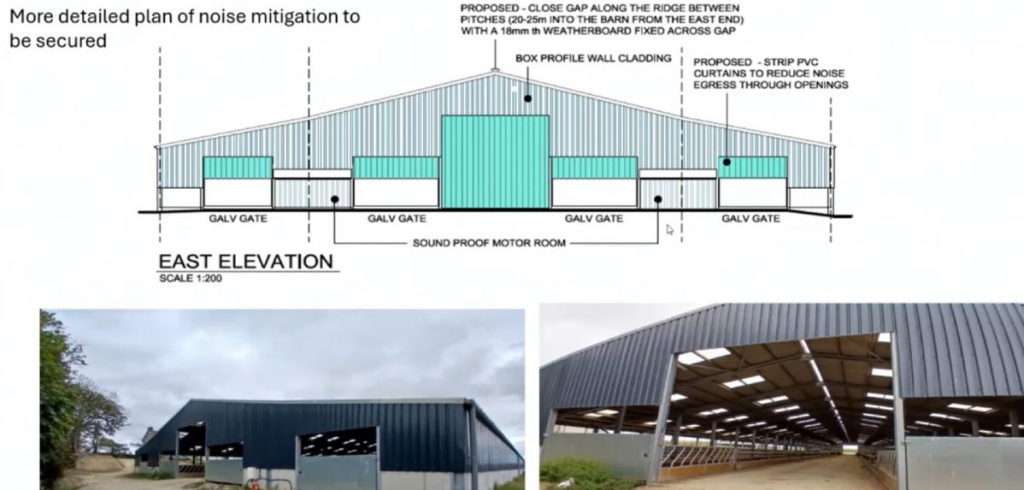
“The introduction of the slurry scraper system has resulted in a new noise source to the locality that is having a significant detrimental impact upon local amenity. The nuisance noise is directly associated with the extended hours of operation of the slurry scraper system and the noise created by the two motors powering the system including the drive mechanism that moves the scraper through the building to remove slurry produced by the housed cattle.
“To further exacerbate the situation, the building has open voids to the eastern gable end, which is within close proximity to the neighbouring property resulting in the building being acoustically weak.
“An acoustic report has been submitted with mitigation methods provided including relocating motors and associated equipment into external enclosures, reduction of noise egress through openings by installing hit-and-miss louvres and/or PVC strip curtains and consideration of blocking the gap between roof pitches along the ridge of the building.”
Three letters of concern were received from members of the public raising concerns including visual and environmental impact, noise issues and a potential for the herd size to increase.
Speaking at the meeting, neighbour Dr Andrew Williams, who stressed he was not seeking to have the shed removed, raised concerns about the noise from the ‘robot scrapers,’ exacerbated by cattle being concentrated in the immediate area from the wider farm complex.
Agent Wyn Harries addressed concerns about the retrospective nature was a result of over-enthusiasm by his client who “jumped the gun”.
He said there was now a scheme that was “fully worked through,” dealing with noise and other issues.
Members backed approval, which includes noise mitigation to address the impact of the robot scrapers; one member, Cllr Tony Wilcox, abstaining on the grounds of the retrospective native of the building “the size of a football field”.
Farming
FUW urges government action as plunging dairy prices threaten family farms
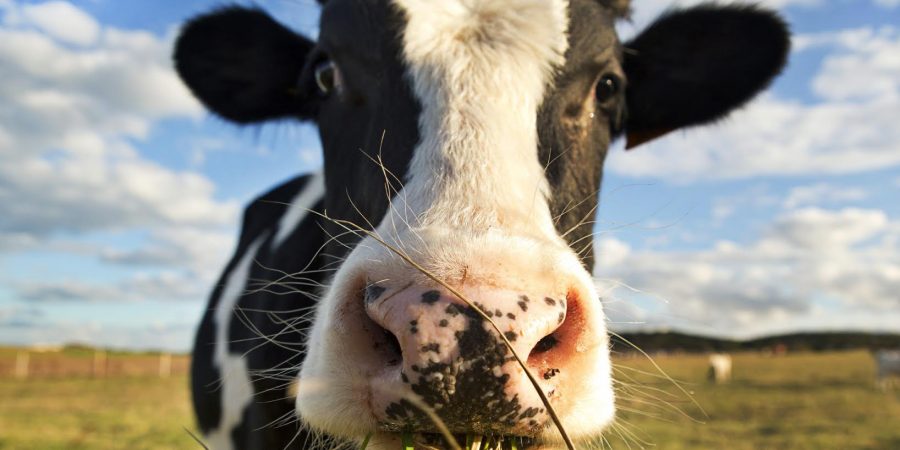
THE FARMER’s UNION OF WALES has sounded the alarm over a sharp and sustained collapse in dairy prices, warning that the situation is placing intolerable pressure on family farms already grappling with regulatory change, rising costs and wider economic uncertainty.
The Union convened an emergency meeting of its Animal Health and Dairy Committee last week to assess the scale of the crisis. Representatives from across Wales reported widespread anxiety, with many members seeing milk prices fall dramatically through the autumn. Processors are now signalling further cuts in early 2026, while commodity markets offer little sign of stability heading into spring.
Farmers, fearful of jeopardising commercial relationships, have approached the FUW confidentially to express grave concern about projected milk payments for the coming months. Many say the offers being made will fall far below the cost of production.
Average milk prices are forecast at just 30–35 pence per litre, against estimated production costs of 39–44 pence per litre (Kite Consulting). On current trajectories, the FUW warns a typical Welsh dairy farm could lose thousands of pounds per month for as long as the downturn persists.
Following its committee meeting, the Union raised the matter directly with Deputy First Minister Huw Irranca-Davies MS during talks in Cardiff on Wednesday, December 3. Officials stressed the immediate threat facing family-run dairy farms and called for urgent consideration of government support to prevent long-term damage to the sector.
Gerwyn Williams, Chair of the FUW Animal Health and Dairy Committee, said the pace of the price crash was “unprecedented”.
“Farmers are facing an impossible situation where input costs remain high while the value of their product plummets. The viability of many family farms is now at serious risk. We need immediate assurances that this crisis is being treated with the urgency it deserves.
“Some can weather a short storm, but rumours that this could continue into summer 2026 will see businesses shut. These modest family farms have already invested heavily to meet regulatory requirements. Cuts on this scale will severely impact their ability to service repayments.”
FUW Deputy President Dai Miles warned that the consequences extend far beyond farm gates.
“Dairy farming underpins thousands of jobs in Wales and is central to the economic, social and environmental fabric of rural communities. When prices fall this sharply, it isn’t just farmers who suffer — local businesses, services and entire communities feel the impact.
“We have made it clear to the Deputy First Minister that government must work with the industry to provide immediate stability and a long-term resilience plan.”
The FUW says it will continue to work with the Welsh Government, processors and supply-chain partners to seek solutions and secure fair, sustainable prices for producers.
-

 Crime5 days ago
Crime5 days agoPhillips found guilty of raping baby in “worst case” judge has ever dealt with
-

 Crime4 days ago
Crime4 days agoKilgetty scaffolder sentenced after driving with cocaine and in system
-

 Crime4 days ago
Crime4 days agoHousing site director sentenced after failing to provide breath sample following crash
-

 Crime4 days ago
Crime4 days agoMotorist banned for three years after driving with cannabis in system
-

 Education3 days ago
Education3 days agoTeaching assistant struck off after asking pupil for photos of her body
-

 News6 days ago
News6 days agoJury retires tomorrow in harrowing Baby C rape trial
-

 Crime4 days ago
Crime4 days agoMilford Haven pensioner denies exposure charges
-

 Local Government6 days ago
Local Government6 days agoNew defamation row erupts after anonymous website targets Herald editor



























